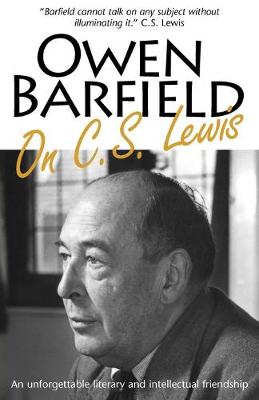C. S. Lewis, theologian and literary scholar, and Owen Barfield, philosopher and London solicitor, were longtime friends. G. B. Tennyson, editor of these papers by Barfield on Lewis, believes this relationship of "two immense intellects" "one of the most absorbing literary friendships of the twentieth century." Lewis called Barfield the "wisest and best of my unofficial teachers"; to Barfield, C. S. Lewis was "the absolutely unforgettable friend." They had been friends and disputants from their Oxford days after the First World War until Lewis's death forty years later. Barfield was his solicitor and trustee in the later years. This is vintage Barfield as well as an astute appraisal of C. S. Lewis's personality and beliefs. In essays, interviews, several poems, and a fragment of fiction, Barfield writes of "the individual essence" of C. S. Lewis, his brilliance, his "absolute honesty of mind," his lack of interest in collectivities-races, nations, movements-his interest only in the individual soul, his "irrepressible bent for comedy," his "keenness in pursuing any point of difference or doubt to its final conclusion." Barfield writes about himself, also, as a way of understanding his friend: "In an argument we always, both of us, were arguing for truth, not for victory, and arguing for truth, not for comfort." Both trusted the imagination, but they differed on its relation to knowledge-"[Lewis] was in love with the imagination" and "to search for any link between myth and fact was for him a crucial error." C. S. Lewis and Owen Barfield had in common an awareness "of the silliness and the triviality of the time" and the conviction that the contemporary loss of the idea of sin was a disaster. But they also disagreed from the first, as Barfield explains, especially about theology, about the nature of God, the process of history. Lewis saw revelation as finished; Barfield saw it as a "continuing process," as he did human history. Lewis considered hierarchy necessary and healthy; Barfield regarded it as an evolutionary phase. Although C. S. Lewis died in 1963, Barfield's reflections on their relationship and analysis of its meaning ended only with his own death, in his hundredth year, in 1997.
- ISBN10 0955958296
- ISBN13 9780955958298
- Publish Date 1 May 2011
- Publish Status Active
- Publish Country GB
- Imprint Barfield Press UK
- Format Paperback (US Trade)
- Pages 188
- Language English
